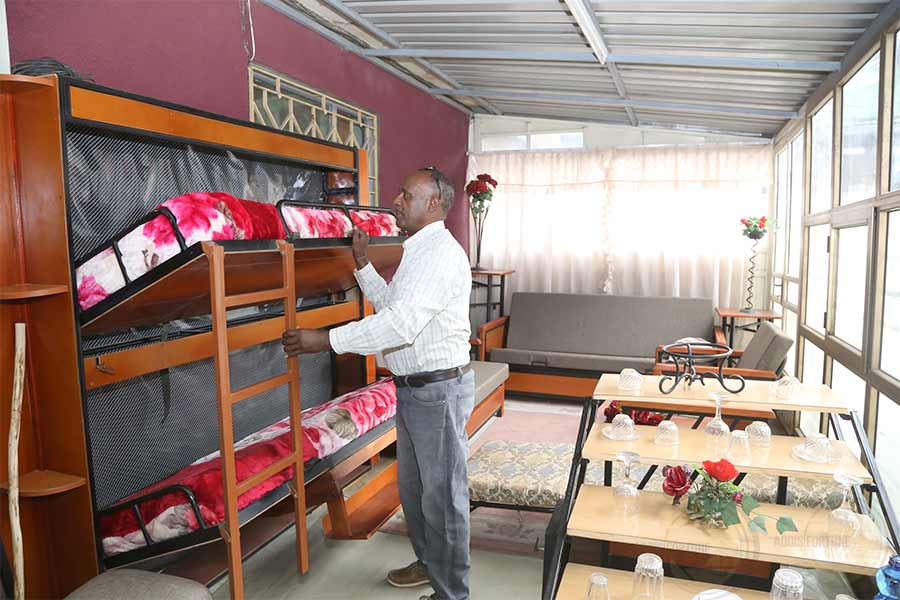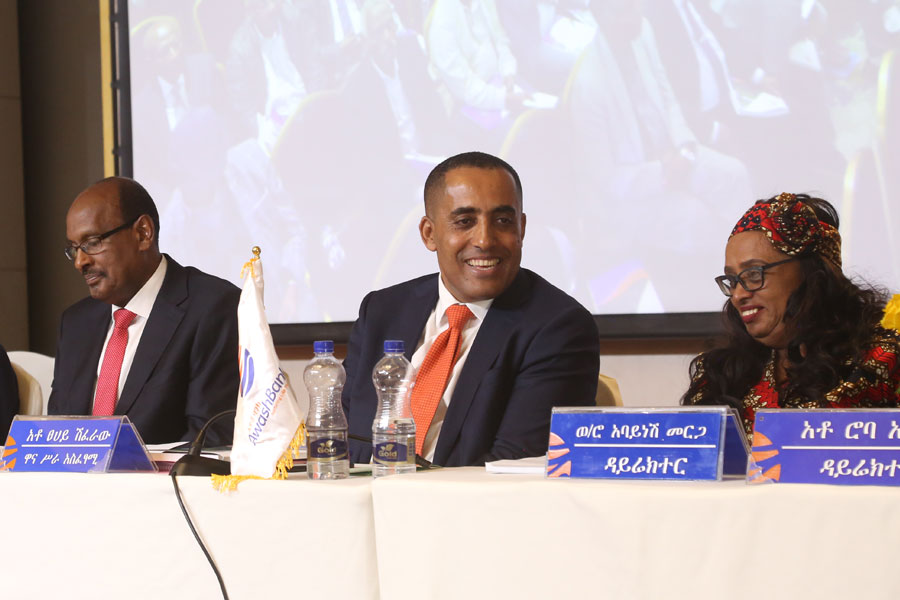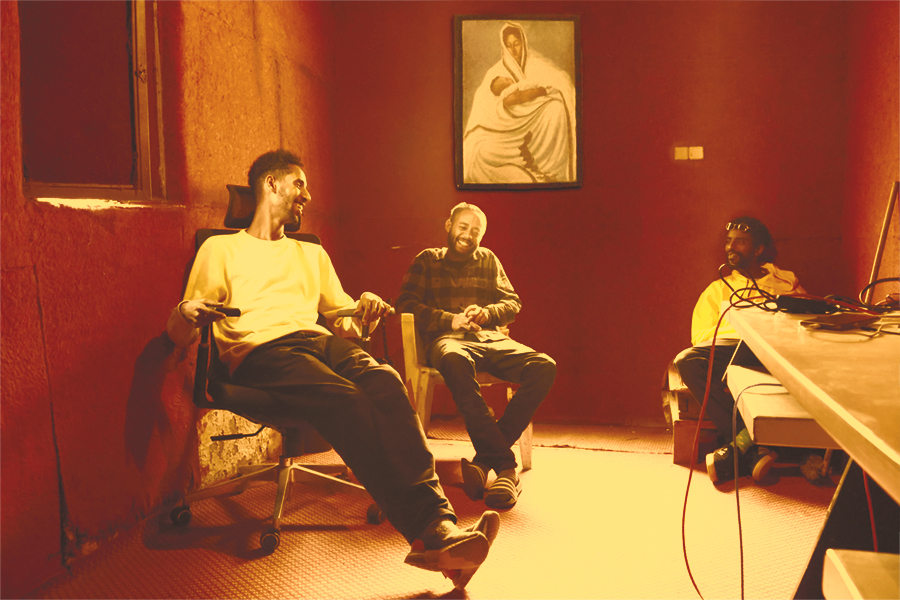
Featured | Mar 27,2021
For a young man, born and raised in a military family, a career in the music industry may be unimaginable.
Abel Paulos (Nadew), a music composer, has air force officers as a father, Paulos Getachew; and grandfather, Getachew Nadew (Gen).
Born in the Kasanchis Menharia area of Addis Abeba, Paulos completed his primary education at Lideta Cathedral and his high school at Bole High school. Upon graduation, he joined Mekan Eyasus Seminary Jazz School, where his career was determined.
“I would have had a military career if I weren’t a composer,” said Abel.
Joining the music industry 12 years ago, Abel has so far produced seven albums and more than 60 singles.
Teddy Afro's popular songs Mar Esketuafand Mematseneand Tsedeniya G. Marqos's new album Yefker Girma are works by Abel that have been well received by audiences.
Abel sees the business of composing music booming in Ethiopia with the advent of new composers, musicians and technology.
Previously, music composers produced music by playing in bands and through long hours of practice, but technology has made such efforts obsolete.
Abel composes music without formal training and with the skills he acquired through experience. When he first started composing, he produced modern tunes but soon realised that his audience prefers Ethiopian melodies.
Abel uses keyboards, bass guitar, saxophone, drums, masinko(traditional violin) and washint(flute) to compose his music.
To compose a single song, Abel might take up to seven days.
A music studio that features multiple instruments used by a composer.
These days the number of music composers joining the industry is increasing, and composers command fees upwards of 10,000 Br for a single musical production.
However, all of them do not generate this value. While professional composers demand up to 10,000 Br to compose a piece of single music; some amateur composers can ask up to 4,000 Br.
For the production of an entire album, a composer may command up to 100,000 Br. To compose a piece of single music may take a month and an album up to a year.
Abraham Kidane, the father of two, is another well-known music composer working for a decade. He has composed many popular modern and traditional music pieces that have gained acceptance and have been well received by various audiences.
He has composed more than 500 pieces of music and produced 60 albums, both in the modern and classical Ethiopian genres. His work includes Jacky Gosee's new release, Semalesh Wey, and Dawit Alemayew’s Ha Lemeneand Ethiopia.
Abraham was born in the Merkato Golla Mikael neighbourhood of Addis Abeba and finished his high school education at Tikur Anbessa. He also attended the Jazz Amba School of Music for two years.
He now works in his studio near Nazra Hotel in Meskel Flower composing music for different musicians. He uses kirar(local 5-string guitar), masinko, piano, saxophone and guitar to compose his music and employs music and mastering software like Pro Tools, Cubase and Izotope.
Abraham earns a top payment of 7,000 Br to compose single piece of music, and he may have up to two clients every month who come to his studio.
Yet Abraham claims that what he earns does not match the work he does.
“The only reason we stay in this profession is that we love our job and music," said Abraham. "It is our inspiration and our hope that the problem will be solved in the future."
Kamuzu Kassa, another well-known music composer with many popular pieces of music to his credit, also says what they earn is far less than what they deserve.
A music studio that features multiple instruments used by a composer.
"To compose a single piece of music takes up to six days, but the earnings gained from it is not balanced," said Kamuzu, who pursued composing as a career at an early age when he was still living in Wolaita. In 2006 he arrived in Addis Abeba and began composing spiritual music. In 2010 he switched to Ethiopian popular music.
Composers work for small pay that do not reflect the amount of time and talent they put into it, according to him.
“In Ethiopia, no music composer earns enough or in equal remuneration of his work,” said Kamuzu, who was born in Mesena, Wolaita and studied at Bele Primary School and completed his secondary school in Wolaita Sodo.
Abel claims that the industry operators are not generating the expected revenues, despite the growth of the music industry.
“We have to get royalties and be paid by radio and television stations that play our music on the air," said Abel. "The industry needs to reward us to inspire and motivate us to continue with our contributions.”
The industry also has another challenge, according to the operators. Abel fears that the local music industry is too dependent on technology.
Technology enables artists without skill or talent to produce music that garners an audience quickly, but the process will have a negative impact on the industry, according to the composers.
Abraham laments that nowadays, technology has hastened the pace dramatically, and it plays a huge role in the music industry.
“I am not opposed to technology, but it is dangerous when we use it too much. Although it offers opportunities to many musicians, it becomes a substitute for talent, abilities and skill that will ultimately harm the music industry.”
Another complaint of Kamuzu is that the importation of musical instruments are considered as luxury items and are taxed accordingly.
“Musical instruments are not luxury items. Therefore, the tax should be changed to remove them from that category,” Kamuzu said.
Kamuzu uses piano, bass guitar, saxophone and guitar and Cubase software to compose music. He claims that he works with at least 10 musicians each month who come to his studio.
He believes that technology contributes many things to the music industry. He points out that in the past, the composition of a single song required the efforts of up to seven people. He also states that technology masks lack of talent and skill by musicians because such defects can be edited out. However, he reflects that untalented artists face difficulties when confronted with live performances.
“To get good acceptance you have to be able to have talent and skill, as well as a feel for music inside of you,” he adds.
The current Ethiopian music industry is not well developed and lags behind other African countries like Senegal and even Kenya, Abel claims.
These days there is a new genre thriving in Ethiopia, Afrobeat, which involves the combination of elements of West African musical style such as fuji and highlife; and American funk and jazz accompanied by chanted vocals, complex intersecting rhythms and percussion.
Fikadu Wari, the owner of Ambasel Music and Film Producer, believes that the number of people who want to produce music is increasing, and it is not balanced with the number of composers.
The good thing is that the music being produced in the country has a variety, and there is a built-in audience that consumes the music, he adds. New composers are coming into the market, because the audience is there to consume the music.
An expert believes that the increasing number of music composers entering the market has its own side effects.
"With the high number of composers, not all of them will care about the quality of their production. Working without censures, anybody can produce a piece of music," said Mieraf Tekle, a lecturer at Jazz Amba School of Music.
For the betterment of the music industry, the country should have standards for our music, according to Mieraf.
"While music standards are universal, we are lagging far behind and far removed from meeting them," says Mieraf. "This lack of professionalism dominates the industry."
"There is no single, qualified sound engineer currently working in Ethiopia," Mieraf adds. "Everybody is working by trial and error without the professional skill and training required to compose music."
PUBLISHED ON
[ VOL
, NO
]

Featured | Mar 27,2021

Agenda | Sep 07,2019

Fortune News | Sep 10,2021

News Analysis | Dec 09,2023

Exclusive Interviews | Sep 09,2023

Featured | Jul 06,2019

Fortune News | Oct 21,2023

Fortune News | Feb 08,2020

News Analysis | Dec 08,2024

Verbatim | Sep 30,2023

Dec 22 , 2024 . By TIZITA SHEWAFERAW
Charged with transforming colossal state-owned enterprises into modern and competitiv...

Aug 18 , 2024 . By AKSAH ITALO
Although predictable Yonas Zerihun's job in the ride-hailing service is not immune to...

Jul 28 , 2024 . By TIZITA SHEWAFERAW
Unhabitual, perhaps too many, Samuel Gebreyohannes, 38, used to occasionally enjoy a couple of beers at breakfast. However, he recently swit...

Jul 13 , 2024 . By AKSAH ITALO
Investors who rely on tractors, trucks, and field vehicles for commuting, transporting commodities, and f...

Oct 18 , 2025
The political establishment, notably the ruling party and its top brass, has become p...

Oct 11 , 2025
Ladislas Farago, a roving Associated Press (AP) correspondent, arrived in Ethiopia in...

Oct 4 , 2025
Eyob Tekalegn (PhD) had been in the Governor's chair for only weeks when, on Septembe...

Sep 27 , 2025
Four years into an experiment with “shock therapy” in education, the national moo...